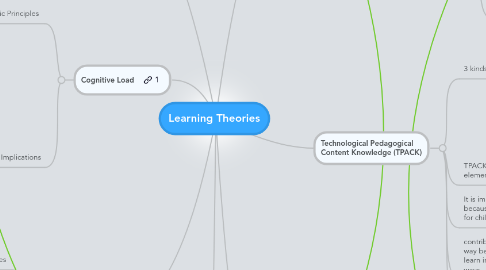
1. Cognitive Load
1.1. Basic Principles
1.1.1. working memory and long term memory
1.1.2. processing information can over or under load a working memory
1.1.3. chunking
1.1.4. learning structures
1.1.5. instructional design
1.1.6. error/fundamental attribution error
1.2. Implications
1.2.1. break assignments down into sections to work on one at a time
1.2.2. give students graphic organizers to work with
1.2.3. give "goal free" problems
1.2.4. teach in chunks and allow students to fill in the "bigger picture"
2. Social Construction of Technology (SCOT)
2.1. Basic Principles
2.1.1. human actions shape technology
2.1.2. how technology is used cannot be understood without understanding how that technology is embedded in its social context
2.1.3. if a technology is needed and intuitive, it will succeed
2.1.4. identifies how the social and technological interact
2.2. Implications
2.2.1. requires students to be aware of how they can have an affect on technology
2.2.2. we as humans determine how well technology benefits us
2.2.3. need to create understanding of why we need technology in the classroom
3. Media Ecology
3.1. Basic Principles
3.1.1. no simplified definition
3.1.2. how the technology changes the society and the environment we’ve grown from
3.1.3. technology has very strong influence on society
3.1.4. technology and media is a mode of communication
3.1.5. media can influence our thoughts and perceptions of the world
3.1.6. technology affects humans
3.2. Implications
3.2.1. incorporate various forms of media in the classroom
3.2.2. allow students to bring in new technology that they think will better help them learn
3.2.3. requires students to be aware that not all information portrayed in media is valid
4. Philosophy of Teachnology
4.1. similar to philosophy of teaching but with incorporation of technology
4.2. is a personal view of a teacher's ideas of teaching and how they can implement technology in the classroom
4.3. includes use of technology in classroom, online, and at home
4.4. what kinds of technology is necessary or deemed appropriate for my classroom?
4.5. do I see the inclusion of technology as important in my teaching philosophy?
4.6. possible inclusion of PLNs and ePortfolios in Teachnology Philosophy
5. Constructivism
5.1. Basic Principles
5.1.1. teacher acts as facilitator
5.1.2. learning is building connections by interacting with the environment
5.1.3. knowledge is constructed by learner from their own experiences
5.1.4. tasks are authentic
5.1.5. discovery-based, collaborative, case-based, active learning
5.1.6. "learning by making"
5.1.7. Vygotsky's "Zone of Proximinal Development"
5.2. Implications
5.2.1. less teacher dominated - role is to guide
5.2.2. students required to become more creative
5.2.3. need to create a classroom for students to be able to construct knowledge in an individual social basis
5.2.4. requires social interaction between teacher and students
6. Connectivism
6.1. Basic Principles
6.1.1. currency is the intent of all connectivist learning activities
6.1.2. learning and knowledge rests in diversity of opinions
6.1.3. capacity to know more is more critical than what is currently known
6.1.4. nurture and maintain connections is needed to facilitate continual learning
6.1.5. see connections between fields, ideas, and concepts
6.2. Implications
6.2.1. group work and class discussion
6.2.2. teacher acts as facilitator
6.2.3. needs to provide students with opportunities to connect with social situations
7. Technological Pedagogical Content Knowledge (TPACK)
7.1. 3 kinds of knowledge
7.1.1. made up of content knowledge (CK), pedagogical knowledge (PK), and technological knowledge (TK)
7.1.1.1. technological knowledge is that of technology and the various tools that implement technology
7.1.1.2. content knowledge is that of concepts and skills that relate to a particular content area or subject
7.1.1.3. pedagogical knowledge is that of the skills and methods; it is related to the profession of teaching
7.1.2. these 3 knowledges can be combined into TCK, PCK, and TPK
